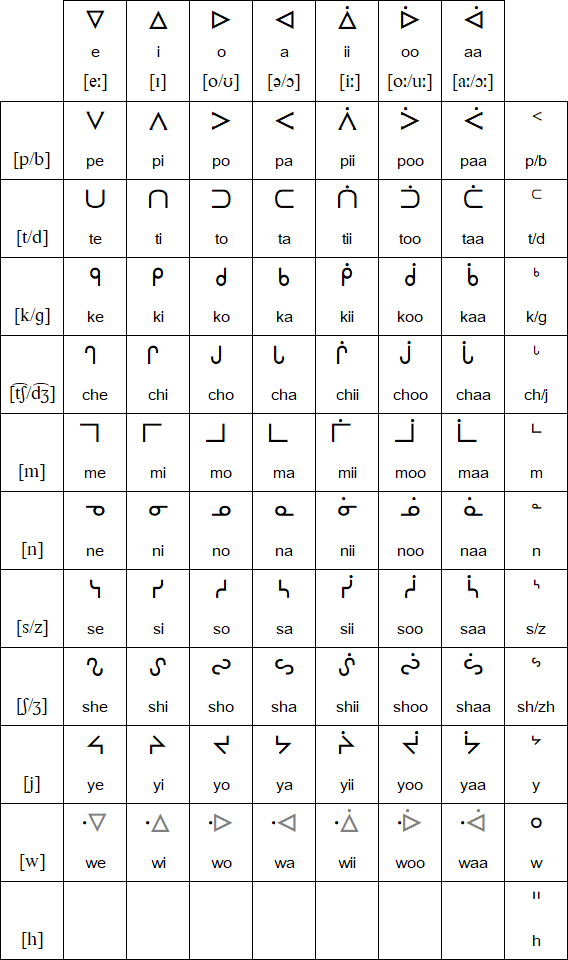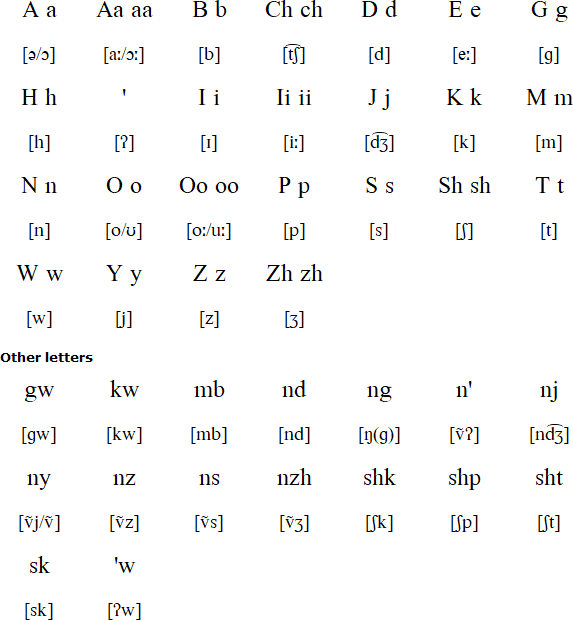Ojibwe is a member of the Ojibwe-Potawatomi branch of the Algonquian language family. It is spoken in parts of Canada and the USA by about 89,000 people. There are several dialects known as Ojibwe or Ojibwa, each of which is classified as a separate language in some sources. Varieties of Ojibwe include:
Source: Ethnologue
In about 1830 James Evans, a Wesleyan missionary, devised a way to write the Ojibwe language of Rice Lake with the Latin alphabet. His goal was to produce a dictionary of Ojibwe to help him to learn the language better, and to help him teach English to the Ojibwe people.
In about 1840, while working at Norway House in Hudson's Bay, Evans invented a syllabic script for the Ojibwe language, based partly on Pitman shorthand, which had been published in 1837. It is thought that his idea to create a syllabic script was based on the Cherokee script.
Evans' syllabary for Ojibwe consisted of just nine symbols, each of which could be written in four different orientations to indicate different vowels. This was sufficient to write Ojibwe. Evans translated parts of the Bible and other religious works into Ojibwe, and later Cree, and printed them using type carved from wood, or made from melted-down linings of tea chests.
Evans later adapted it to write Cree. The script proved popular with Ojibwe and Cree speakers, and within about 10 years, many of them had learnt to read and write it, learning mainly from family or friends. As paper was scarce at the time, they wrote on birch bark with soot from burnt sticks, or carved messages in wood, and nicknamed James Evans 'The man who made birch bark talk'.
The Ojibwe script continued to be widely used until the 1950s and 1960s, when the integration policies of Department of Indian and Northern Affairs led to a decline in use to the script among Ojibwe children taught to write in the Roman alphabet.
Main source: Murdoch, John Stewart, Syllabics: A Successful Educational Innovation (University of Manitoba, 1981).

Hear Ojibwe pronunciation
Each variety of Ojibwe that uses the Latin alphabet has its own spelling system, most of which are based on English or French orthographies. The double vowel system, devised by Charles Fiero, is the most popular as it is easy to use.

Download script charts for Ojibwe (Excel)


Kakinawenen kapimatisiwat nitawikiwak tipenimitisowinik mina tapita kiciinetakosiwin kaye tepaketakosiwin. Otayanawa mikawiwin kaye nipwakawin minawa tash ciishikanawapatiwapan acako minowiciwitiwinik.
Source (pointed text): http://anishinabemowin.21.forumer.com/viewtopic.php?t=34
All human beings are born free and equal in dignity and rights. They are endowed with reason and conscience and should act towards one another in a spirit of brotherhood.
(Article 1 of the Universal Declaration of Human Rights)
Information about Ojibwe | Phrases | Numbers | Time | Tower of Babel
Information about the Ojibwe language and script
http://www.languagegeek.com/algon/ojibway/anishinaabemowin.html
http://en.wikipedia.org/wiki/Ojibwe_writing_systems
http://en.wikipedia.org/wiki/Ojibwe_language
https://en.wikipedia.org/wiki/Western_Ojibwa_language
http://www.native-languages.org/chippewa.htm
https://creeliteracy.org/beginning-to-read-plains-cree-in-standard-roman-orthography/a-serious-read-on-syllabics-the-m-ed-thesis-of-john-murdoch/
Ojibwe courses
http://anishinaabemodaa.com
http://ojibwe.net/lessons/
http://www.kojb.org/learnOjibwe.html
https://7000.org/ojibwe-language/
https://7000.org/courses/northwestern-ojibwe/
https://www.7000.org/courses/central-ojibwe
Ojibwe phrases
http://www.ojibwe.org/home/pdf/ojibwe_beginner_dictionary.pdf
http://www.nativetech.org/shinob/ojibwelanguage.html
Ojibwemowin Zagaswe'idiwin (Ojibwe Language Society)
http://www.ojibwemowin.com
Ojibwa people
http://en.wikipedia.org/wiki/Ojibwa
Information about James Evans
http://www.biographi.ca/en/bio.php?id_nbr=3376
https://library.vicu.utoronto.ca/collections/special_collections/f10_james_evans
https://en.wikipedia.org/wiki/James_Evans_(linguist)
https://archive.org/details/jamesevansinven00maclgoog/page/n7
Abenaki, Algonquin, Arapaho, Atikamekw, Blackfoot, Cheyenne, Chippewa, Cree (East), Cree (Moose), Cree (Plains), Cree (Swampy), Cree (Woods), Fox, Innu (Montagnais), Kickapoo, Malecite-Passamaquoddy, Loup, Massachusett (Wampanoag), Menominee, Miami, Míkmaq, Mohegan, Mohican, Munsee, Narragansett, Naskapi, Ojibwe, Oji-Cree, Ottawa, Penobscot, Powhatan, Potawatomi, Quiripi, Sauk, Shawnee, Unami (Lenape)
Blackfoot, Carrier, Chipewyan, Cree (East), Cree (Moose), Cree (Plains), Cree (Swampy), Cree (Woods), Inuktitut, Naskapi, Ojibwe, Oji-Cree
Languages written with the Latin alphabet
Ahom, Aima, Arleng, Badagu, Badlit, Basahan, Balinese, Balti-A, Balti-B, Batak, Baybayin, Bengali, Bhaiksuki, Bhujimol, Bilang-bilang, Bima, Blackfoot, Brahmi, Buhid, Burmese, Carrier, Chakma, Cham, Cree, Dehong Dai, Devanagari, Dham Lipi, Dhankari / Sirmauri, Ditema, Dives Akuru, Dogra, Ethiopic, Evēla Akuru, Fox, Fraser, Gond, Goykanadi, Grantha, Gujarati, Gunjala Gondi, Gupta, Gurmukhi, Halbi Lipi, Hanifi, Hanuno'o, Hočąk, Ibalnan, Incung, Inuktitut, Jaunsari Takri, Javanese, Kaithi, Kadamba, Kamarupi, Kannada, Kawi, Kharosthi, Khema, Khe Prih, Khmer, Khojki, Khudabadi, Kirat Rai, Kōchi, Kodava Lipi, Komering, Kulitan, Kurukh Banna, Lampung, Lanna, Lao, Lepcha, Limbu, Lontara/Makasar, Lota Ende, Magar Akkha, Mahajani, Malayalam, Meitei (Modern), Manpuri (Old), Marchen, Meetei Yelhou Mayek, Meroïtic, Masarm Gondi, Modi, Mon, Mongolian Horizontal Square Script, Multani, Nandinagari, Newa, New Tai Lue, Ojibwe, Odia, Ogan, Pahawh Hmong, Pallava, Phags-pa, Purva Licchavi, Qiang / Rma, Ranjana, Rejang (Kaganga), Sasak, Savara, Satera Jontal, Shan, Sharda, Sheek Bakrii Saphaloo, Siddham, Sinhala, Sorang Sompeng, Sourashtra, Soyombo, Sukhothai, Sundanese, Syloti Nagri, Tagbanwa, Tai Noi, Takri, Tamil, Tanchangya (Ka-Pat), Tani, Thaana, Telugu, Thai, Tibetan, Tigalari, Tikamuli, Tocharian, Tolong Siki, Vatteluttu, Warang Citi
Page last modified: 17.10.24
[top]
You can support this site by Buying Me A Coffee, and if you like what you see on this page, you can use the buttons below to share it with people you know.

If you like this site and find it useful, you can support it by making a donation via PayPal or Patreon, or by contributing in other ways. Omniglot is how I make my living.
Note: all links on this site to Amazon.com, Amazon.co.uk
and Amazon.fr
are affiliate links. This means I earn a commission if you click on any of them and buy something. So by clicking on these links you can help to support this site.
[top]